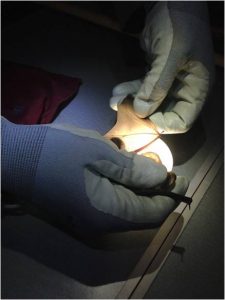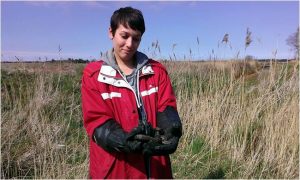Rochelle’s blog
It’s nearly Christmas which means it has been exactly a year since I became a member of the Wild Frontier Ecology team. Unfortunately it is also means that my time here is coming to an end. The year has flown by so quickly which I believe is testament to how enjoyable working for Wild Frontier has been.

Taking biometric data of a brown long-eared bat caught during a mist netting session.
I am grateful to all the team for giving me the opportunity to build on my skills and experiences within a friendly and supportive work environment, and what an opportunity it has been! I have been introduced to bird song ID, learnt how to handle adders, mist netted for bats, surveyed for water voles and badgers, learnt to identify plants and trees, completed a radio-tracking course, caught hundreds of newts and most importantly of all sifted through animal droppings (an essential skill for any self-respecting ecologist).
Of particular highlight was a crash-course in adder handling in the Norfolk Broads and handling my first bat during an after work mist netting session! The ecologists at Wild Frontier are experts in their respective fields and incredibly passionate about what they do which is evident in the quality of the training and advice I have received.

Learning how to handle adders in the Norfolk Broads.
As well as practical experience I have also developed my analytical and data handling skills, report writing, GIS skills, critical thinking, communication skills and table tennis! I have no doubt in my mind that the personal and professional development I have accrued during my time at Wild Frontier will help me progress through my career. Indeed I have been lucky enough to win a studentship at The University of Bristol and I believe that my success at the application and interview stage was due, in part, to the skills and confidence gained at Wild Frontier.
I have many fond memories to take away with me when I leave Norfolk as well as a wealth of new knowledge and skills. I’d like to thank the team for their patience and encouragement and wish them all the best in the future.
– Rochelle

